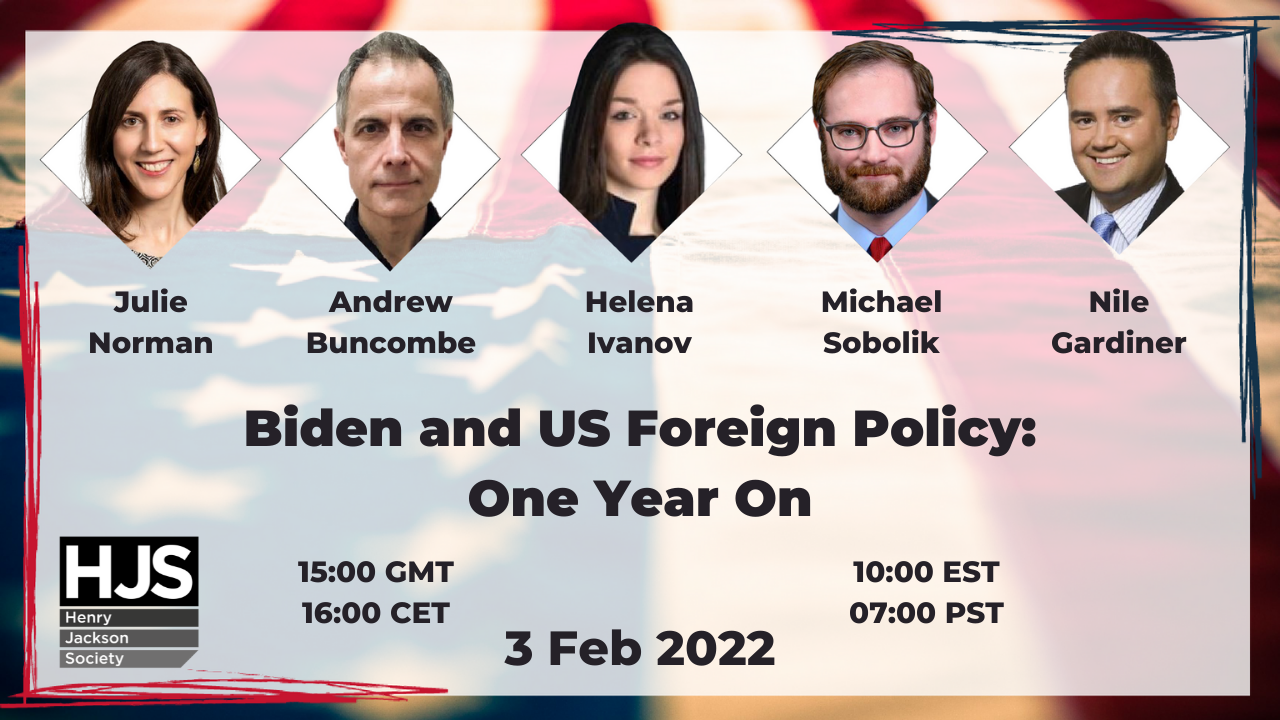Biden and US Foreign Policy: One Year On

- This event has passed.
Biden and US Foreign Policy: One Year On
3rd February 2022 @ 3:00 pm - 4:00 pm

The Biden administration has faced a challenging first year in office. From the withdrawal from Afghanistan, raised tensions on the Ukraine-Russia border, and the Indo-Pacific tilt through to the diplomacy involved in coordinating the world’s response to the COVID-19 pandemic, foreign policy questions have thrown themselves at the President’s team in rapid succession, and have not always been successfully answered.
Examining his record after one year in office, what have we learned about the US approach to foreign policy under President Biden, how has this approach driven success and failure, and what can we expect to see in the near-term future?
The Henry Jackson Society is pleased to gather a world expert panel to reflect on the first year of Biden’s Presidency and discuss the likely trajectory of Biden’s foreign policy in the coming years.

Andrew Buncombe is the Chief US Correspondent of The Independent. He has reported from more than 40 counties and each of the US’s 50 states. He is based in Seattle and has a roving beat that takes in everything from politics and policy to social justice and technology. He always prefers to report from on the ground, whether it is one of Donald Trump’s rallies or a protest for racial justice.

Nile Gardiner is Director of the Margaret Thatcher Center for Freedom at The Heritage Foundation, and a leading authority on Brexit. Before joining Heritage, Dr. Gardiner served as a foreign policy aide to Lady Thatcher in her private office in London, assisting her with her final book, Statecraft: Strategies for a Changing World and advising her on a number of international issues. His work for Lady Thatcher helped shape her foreign policy vision, including her powerful call in Statecraft for Great Britain to consider leaving the European Union, which laid the foundations for Brexit over a decade later.
Dr. Gardiner is a prominent expert on US-British relations, US foreign policy, and the transatlantic alliance, and received his M.A., M.Phil. and Ph.D. degrees in History from Yale University, and B.A. and M.A. in Modern History from Oxford University. He has served as a foreign policy adviser to three US presidential candidates: Senator Ted Cruz, Governor Mitt Romney and Mayor Rudy Giuliani. He has testified several times before Congress on foreign policy issues.
Nile Gardiner frequently provides analysis of global events for US and international television networks including Fox News Channel, Fox Business Network, CNN, CNBC, GB News, Sky News and the BBC. He is a regular contributor to The Daily Telegraph, and his writing has appeared in The Wall Street Journal, The Times, The Sunday Times, The Daily Mail, USA Today, The New York Times Room for Debate, The Washington Times, National Review and The Boston Globe.

Helena Ivanov is a PhD Candidate in International Relations at the London School of Economics and Political Science and an Associate Fellow at The Henry Jackson Society. Her research focuses on the relationship between propaganda and violence against civilians. In her thesis, Helena examined the role propaganda played during the Yugoslav Wars and produced a model for studying propaganda which details the key phases, functions, discourses, and techniques of propaganda (the model itself is applicable to other contexts). Additionally, Helena also served as a Manager at the Centre for International Studies at the LSE.

Julie Norman is Lecturer in Politics and International Relations and Co-Director of the Centre on US Politics (CUSP) at UCL. She has published widely on security, conflict, and foreign policy, and her research interests include political violence, polarisation, and mobilisation. Norman also works as a policy consultant, providing research-based recommendations to the UN, British Council, US Institute of Peace (USIP), and other governmental bodies and NGOs. She is the host of the podcast, “The Julie Norman Show,” and a frequent contributor on US politics to the BBC, CNBC, Al Jazeera, The Hill, and other media outlets.

Michael Sobolik joined the American Foreign Policy Council (AFPC) as a Fellow in Indo-Pacific Studies in September 2019. His work covers American and Chinese grand strategy, regional economic and security trends, America’s alliance architecture in Asia, and human rights. Michael also serves as editor of AFPC’s Indo-Pacific Monitor e-bulletin (AFPC’s review of developments in the region) and hosts GREAT POWER PODCAST (a show about American foreign policy and great power competition). His analysis has appeared in The Diplomat, Foreign Policy, The Hill, Jane’s Defence Weekly, The National Interest, National Review, Newsweek, Providence, and RealClearDefense. He has also testified before the U.S. Congress on America’s foreign policy in Southeast Asia.
Prior to joining AFPC, Michael served as a Legislative Assistant in the United States Senate from 2014 to 2019. While in the Senate, Michael drafted legislation on China, Russia, India, Taiwan, North Korea, and Cambodia, as well as strategic systems and missile defense.
Michael is a graduate of Texas A&M University, where he studied political philosophy as an undergraduate. He also earned his Master of International Affairs degree in American grand strategy and U.S.-China relations at the Bush School of Government and Public Service.
***
EVENT SUMMARY
On the 3rd February 2022, Helena Ivanov, Associate Fellow at The Henry Jackson Society, Dr Julie Norman, Co-Director of the Centre on US Politics at UCL, Andrew Buncombe, Chief US Correspondent of The Independent, Michael Sobolik, Fellow in Indo-Pacific Studies at the American Foreign Policy Council, Dr Nile Gardiner, Director of the Margaret Thatcher Center for Freedom at The Heritage Foundation, discuss the success and failures of President Biden’s foreign policy and what to expect in the future.
Helena Ivanov started the discussion by introducing the speakers and the topic of discussion. Andrew Buncombe then spoke about the characteristics of an emerging Biden doctrine that is focused on China, diplomacy and coalition politics but most importantly avoiding the use of American soldiers in combat. Dr Gardiner then discussed the failures of President Biden’s foreign policy such as the collapse of Afghanistan, the apparent lack of a coherent strategy, as well as declining prestige of the US in Europe and the UK. Dr Norman then argued that President Biden needed to focus on more pressing domestic issues and that while his administration did lean too much on diplomacy initially, it has now adopted a more assertive foreign policy. Michael Sobolik spoke of the conflict within the Democratic party between those that champion rights and those that champion climate change and touched on the muddled approach the US has had to China as they are pursuing a policy of competition and cooperation.
The discussion then closed with a series of question possible outcomes of the Ukrainian-Russian conflict, and President Biden’s apparent lack of support from the American public.
RELATED EVENTS
Engaging Central Asia: Empowering the Regional Transformation
Central Asia’s vast energy resources and potential transit routes between Europe and Asia create valuable opportunities to source and transport necessary materials without reliance on Russia. Additionally, the region’s geographic … Continued
The Return of the Oldest Hatred: Understanding Contemporary Antisemitism
Ever since the Hamas pogroms of October 7, 2023, which sparked the ongoing war in Gaza, there has been a huge rise in antisemitism in the United Kingdom. In the last … Continued
Israel Crisis Update: The Changing Threat from Iran
Iran’s recent attack against Israel saw it launching cruise and ballistic missiles as well as drones from its own soil, rather than relying on proxy forces. How should we understand the … Continued





